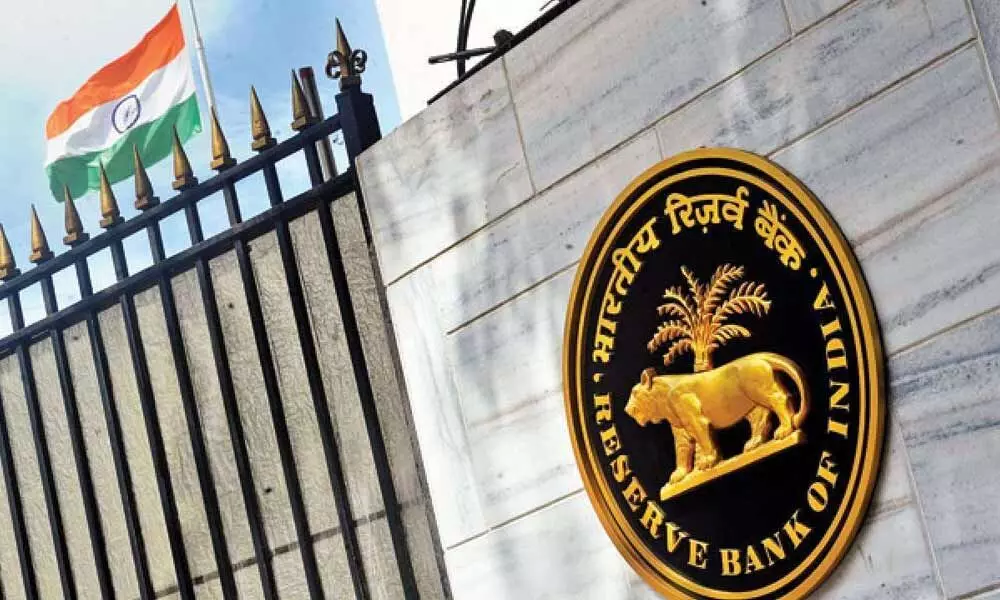Live
- Sri Aurobindo’s vision: Bridging the gap for holistic human evolution
- Sri Radha Govinda Ratha Yatra conducted
- A feast of music, dance and drama
- Mohan Babu denies absconding amid legal controversy
- Swift City to boost industrial growth in Bengaluru
- Allu Arjun walks out free after spending night in jail
- Congress harbours no grudge against any actor: TPCC chief
- Allu Arjun meets Upendra after release from prison, wishes for his ‘UI’ film
- Government Launches Uniform Diet Plan to Boost Student Health and Education
- Robust Security Arrangements for TSPSC Group-2 Exams in Jogulamba Gadwal
Just In

Reserve Bank of India
Apex bank transferred Rs 1.76 lakh cr last year, including `1.23 lakh cr dividend
Mumbai: The Reserve Bank of India board on Friday approved a dividend payout of Rs 57,128 crore to the central government, a move in line with the Budget expectation but may not help plug a huge revenue hole created by the pandemic and slowing economy.
The surplus transfer of Rs 57,128 crore for the accounting year 2019-20 compared with Rs 1.76 lakh crore transferred last year, which included Rs 1.23 lakh crore as dividend and Rs 52,637 crore excess provisions identified as per the revised Economic Capital Framework (ECF). In a statement, the RBI said its central board headed by Governor Shaktikanta Das "reviewed the current economic situation, continued global and domestic challenges and the monetary, regulatory, and other measures taken by RBI to mitigate the economic impact of Covid-19 pandemic". "The Board also approved the transfer of Rs 57,128 crore as surplus to the Central Government for the accounting year 2019-20, while deciding to maintain the Contingency Risk Buffer at 5.5 per cent," it said. Finance Minister Nirmala Sitharaman in the budget for 2020-21 had provisioned receipt of Rs 60,000 crore in dividend from the RBI and other banks to bridge the fiscal deficit. But, government officials had expected more from the Reserve Bank of India (RBI).
The government is facing a larger-than-expected shortfall in revenue as the economy heads for its first full-year contraction since 1979. With the Covid-19 pandemic disrupting businesses, it is widely speculated that tax collections will miss the target. At the same time, the government is being forced to spend more to cushion the blow from the pandemic, straining the budget deficit.
The central bank largely earns profit through its trading of currencies and government bonds as well as printing of notes and coins. Part of these earnings is set aside by the RBI for its operational and contingency needs, while the rest is transferred to the government in the form of dividend. RBI's financial year runs from July-June at present and is scheduled to be harmonised with the government's April-March fiscal starting FY22. In the current year, the RBI will have a nine-month financial year, ending in March. The central bank's payout to the government last year was more due to a one-time transfer on account of the adoption of a new economic capital framework that calls for maintaining the level of the contingency risk buffer, or realised equity, at between 5.5 and 6.5 per cent of RBI''s balance sheet.
The RBI board decided to maintain the buffer at 5.5 per cent. Prior to the adoption of former RBI Governor Bimal Jalan panel recommendation on the level of realised equity, the buffer stood at 6.8 per cent. The surplus is commonly called 'dividend'. RBI had in 2018-19 transferred Rs 65,896 crore, Rs 50,000 crore in 2017-18 and Rs 30,659 crore in 2016-17.

© 2024 Hyderabad Media House Limited/The Hans India. All rights reserved. Powered by hocalwire.com







